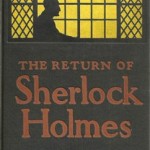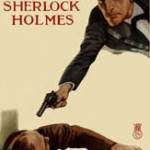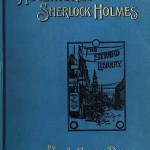Holmes sat in silence for some little time.
“Where is the gentleman to whom you are engaged?” he asked at last.
“He is in the Midland Electrical Company, at Coventry.”
“He would not pay you a surprise visit?”
“Oh, Mr. Holmes! As if I should not know him!”
“Have you had any other admirers?”
“Several before I knew Cyril.”
“And since?”
“There was this dreadful man, Woodley, if you can call him an admirer.”
“No one else?”
Our fair client seemed a little confused.
“Who was he?” asked Holmes.
“Oh, it may be a mere fancy of mine; but it had seemed to me sometimes that my employer, Mr. Carruthers, takes a great deal of interest in me. We are thrown rather together. I play his accompaniments in the evening. He has never said anything. He is a perfect gentleman. But a girl always knows.”
“Ha!” Holmes looked grave. “What does he do for a living?”
“He is a rich man.”
“No carriages or horses?”
“Well, at least he is fairly well-to-do. But he goes into the city two or three times a week. He is deeply interested in South African gold shares.”
“You will let me know any fresh development, Miss Smith. I am very busy just now, but I will find time to make some inquiries into your case. In the meantime, take no step without letting me know. Good-bye, and I trust that we shall have nothing but good news from you.”
“It is part of the settled order of Nature that such a girl should have followers,” said Holmes, he pulled at his meditative pipe, “but for choice not on bicycles in lonely country roads. Some secretive lover, beyond all doubt. But there are curious and suggestive details about the case, Watson.”
“That he should appear only at that point?”
“Exactly. Our first effort must be to find who are the tenants of Charlington Hall. Then, again, how about the connection between Carruthers and Woodley, since they appear to be men of such a different type? How came they BOTH to be so keen upon looking up Ralph Smith’s relations? One more point. What sort of a menage is it which pays double the market price for a governess but does not keep a horse, although six miles from the station? Odd, Watson—very odd!”
“You will go down?”
“No, my dear fellow, YOU will go down. This may be some trifling intrigue, and I cannot break my other important research for the sake of it. On Monday you will arrive early at Farnham; you will conceal yourself near Charlington Heath; you will observe these facts for yourself, and act as your own judgment advises. Then, having inquired as to the occupants of the Hall, you will come back to me and report. And now, Watson, not another word of the matter until we have a few solid stepping-stones on which we may hope to get across to our solution.”
We had ascertained from the lady that she went down upon the Monday by the train which leaves Waterloo at 9:50, so I started early and caught the 9:13. At Farnham Station I had no difficulty in being directed to Charlington Heath. It was impossible to mistake the scene of the young lady’s adventure, for the road runs between the open heath on one side and an old yew hedge upon the other, surrounding a park which is studded with magnificent trees. There was a main gateway of lichen-studded stone, each side pillar surmounted by mouldering heraldic emblems, but besides this central carriage drive I observed several points where there were gaps in the hedge and paths leading through them. The house was invisible from the road, but the surroundings all spoke of gloom and decay.
The heath was covered with golden patches of flowering gorse, gleaming magnificently in the light of the bright spring sunshine. Behind one of these clumps I took up my position, so as to command both the gateway of the Hall and a long stretch of the road upon either side. It had been deserted when I left it, but now I saw a cyclist riding down it from the opposite direction to that in which I had come. He was clad in a dark suit, and I saw that he had a black beard. On reaching the end of the Charlington grounds, he sprang from his machine and led it through a gap in the hedge, disappearing from my view.
A quarter of an hour passed, and then a second cyclist appeared. This time it was the young lady coming from the station. I saw her look about her as she came to the Charlington hedge. An instant later the man emerged from his hiding-place, sprang upon his cycle, and followed her. In all the broad landscape those were the only moving figures, the graceful girl sitting very straight upon her machine, and the man behind her bending low over his handle-bar with a curiously furtive suggestion in every movement. She looked back at him and slowed her pace. He slowed also. She stopped. He at once stopped, too, keeping two hundred yards behind her. Her next movement was as unexpected as it was spirited. She suddenly whisked her wheels round and dashed straight at him. He was as quick as she, however, and darted off in desperate flight. Presently she came back up the road again, her head haughtily in the air, not deigning to take any further notice of her silent attendant. He had turned also, and still kept his distance until the curve of the road hid them from my sight.
I remained in my hiding-place, and it was well that I did so, for presently the man reappeared, cycling slowly back. He turned in at the Hall gates, and dismounted from his machine. For some minutes I could see him standing among the trees. His hands were raised, and he seemed to be settling his necktie. Then he mounted his cycle, and rode away from me down the drive towards the Hall. I ran across the heath and peered through the trees. Far away I could catch glimpses of the old gray building with its bristling Tudor chimneys, but the drive ran through a dense shrubbery, and I saw no more of my man.
However, it seemed to me that I had done a fairly good morning’s work, and I walked back in high spirits to Farnham. The local house agent could tell me nothing about Charlington Hall, and referred me to a well known firm in Pall Mall. There I halted on my way home, and met with courtesy from the representative. No, I could not have Charlington Hall for the summer. I was just too late. It had been let about a month ago. Mr. Williamson was the name of the tenant. He was a respectable, elderly gentleman. The polite agent was afraid he could say no more, as the affairs of his clients were not matters which he could discuss.
Mr. Sherlock Holmes listened with attention to the long report which I was able to present to him that evening, but it did not elicit that word of curt praise which I had hoped for and should have valued. On the contrary, his austere face was even more severe than usual as he commented upon the things that I had done and the things that I had not.
“Your hiding-place, my dear Watson, was very faulty. You should have been behind the hedge, then you would have had a close view of this interesting person. As it is, you were some hundreds of yards away and can tell me even less than Miss Smith. She thinks she does not know the man; I am convinced she does. Why, otherwise, should he be so desperately anxious that she should not get so near him as to see his features? You describe him as bending over the handle-bar. Concealment again, you see. You really have done remarkably badly. He returns to the house, and you want to find out who he is. You come to a London house agent!”
“What should I have done?” I cried, with some heat.





